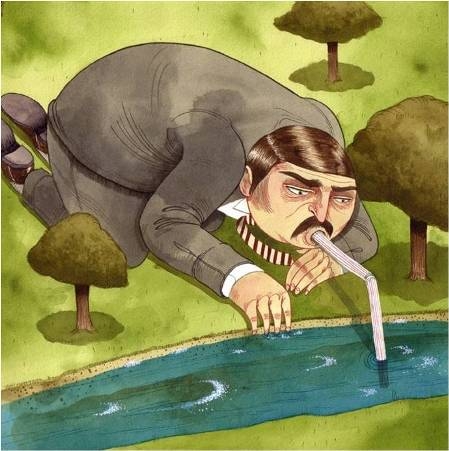It’s been one year since a Four Corners investigation uncovered “the biggest water grab in Australia’s history”. The program blew the lid off a massive can of worms but, despite five separate inquiries, there is no sign of the scandals abating.
The Four Corners investigation revealed illegal water use, meter tampering and rogue cotton growers sucking out billions of litres of water. Water that was meant to flow down the Darling River to benefit wetlands, birds, fish, farms and communities all the way down to Victoria and South Australia!
Even worse, the NSW government was letting them get away with it. Secret recordings revealed a top NSW water bureaucrat offering to share inside government information with irrigation lobbyists.
The program caused a furore! Five inquiries were pretty quickly announced and, a couple of months later, the South Australian government kicked off a Royal Commission.
The NSW Matthews Inquiry revealed big problems with the compliance regime in NSW and serious concerns about the professionalism of departmental staff and the even-handedness of their consultations with different stakeholders.
The NSW government claims to have taken the findings on board, but new allegations continue to surface, including that the NSW Minister altered water sharing rules to advantage irrigators and approved illegal works to harvest more water.
Healthy Rivers campaigner Juliet Le Feuvre explains how dodgy water deals in New South Wales impact Victoria.
But it’s not just NSW. Since the Four Corners report scarcely a week has gone by without a new scandal being aired. These include:
- Deputy Prime Minister Barnaby Joyce telling irrigators in a Shepparton pub that he would get water back off the ‘greenies’ and give it to irrigators.
- One of Queensland’s biggest cotton growers is expected to be charged with fraud for using $25 million of federal government funding to construct illegal levees and dams.
- ‘Goanna’ water purchases where the federal government paid double the market value for water that stands very little chance of ever being delivered for the environment.
- Massive failure by the MDBA to follow up on compliance problems when they knew environmental water was not going where it was supposed to.
- Criminal proceedings against two Barwon-Darling irrigators for water theft.
All this and much more is documented by the Australia Institute in their report ‘The Basin Files Volume 1’.
But the worst thing is that the Murray-Darling Basin Plan, which is supposed to fix our rivers, is becoming more and more compromised in favour of irrigators. In recent months:
- The MDBA slashed environmental water recovery targets in both the northern basin and the southern basin.
- The Victorian and NSW governments are substituting untested and expensive infrastructure projects for the water our floodplains so desperately need.
- Some of Australia’s top scientists have doubts about how much water is actually being returned to rivers by the water-saving projects that are favoured by governments.
- NSW is still not protecting environmental water as it travels through river systems.
- And last but not least, the SA Royal Commission is questioning the legality of the entire Basin Plan!
The Turnbull government has even applied for an injunction to prevent departmental and MDBA staff from appearing at the SA Royal Commission!
Perhaps the saddest thing is that despite thousands of people from all over Australia expressing their concern about what was happening, the Senate did not stop the cuts to environmental water recovery that are now part of the Basin Plan.

Rogue industrial cotton growers have been sucking out billions of litres of water out of our rivers
The pressure exerted by irrigator lobby groups and by the Victorian and NSW governments on their behalf has proved overwhelming and our rivers are the losers.
So now it’s time to redress the balance.
Speaking up for our rivers has never been more important; it’s the only thing that is going to make governments listen. Please make a start by sharing what’s happening to your river >> click here.